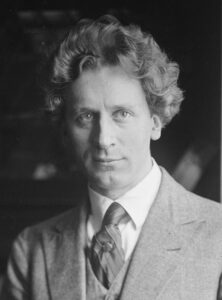Grainger, Lincolnshire Posy
 Percy Grainger (1882-1961) is another composer, with others like Bartók and Kodály, who collected folk songs and incorporated them into his compositions. The new technology of the gramophone made field recordings possible, while that same leap in technology threatened the cultural forces that fostered folk traditions. Urbanization and mass communication would eventually sideline folk music’s essential lifeblood—oral transmission. Bartók and Kodály preserved Hungarian folk music, John and Alan Lomax preserved American folk music, and Percy Grainger did the same in England.
Percy Grainger (1882-1961) is another composer, with others like Bartók and Kodály, who collected folk songs and incorporated them into his compositions. The new technology of the gramophone made field recordings possible, while that same leap in technology threatened the cultural forces that fostered folk traditions. Urbanization and mass communication would eventually sideline folk music’s essential lifeblood—oral transmission. Bartók and Kodály preserved Hungarian folk music, John and Alan Lomax preserved American folk music, and Percy Grainger did the same in England.
He was born in Australia, but at the age of 13 he moved with his mother to Frankfurt to study piano at the conservatory. Following his studies, he settled in England and established himself as a concert pianist. He developed an interest in folk music and began using the gramophone to collect field recordings in 1906. With the outbreak of World War I in 1914, Grainger moved to the United States. When the U.S. entered the war, he enlisted as an Army bandsman, serving for 18 months as a saxophonist in a stateside band. He settled in White Plains, New York shortly after the war and lived there until his death.
Grainger composed many works for wind band and has a significant place in the band repertoire. I can remember encountering his music for the first time when our high school band director began rehearsing Lincolnshire Posy (written in 1937). It was a significant departure from the usual fare and gave the French horns the prominence we deserve.
This performance is conducted by our longtime friend and colleague, Jerry Junkin, who also conducts the Dallas Winds. For a deeper dive into Grainger’s music and his peculiar personality, I recommend Professor Carol’s podcast Perceiving Percy (under 15 minutes).



